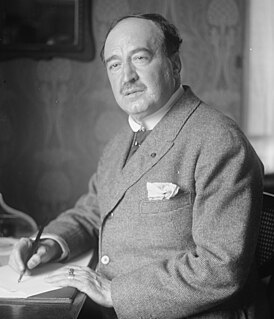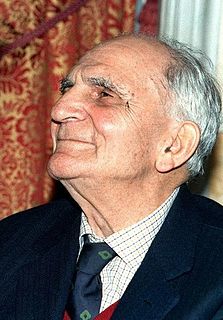Related Research Articles

Luigi Pirandello was an Italian dramatist, novelist, poet, and short story writer whose greatest contributions were his plays. He was awarded the 1934 Nobel Prize in Literature for "his almost magical power to turn psychological analysis into good theatre." He was an Italian nationalist and supported Fascism in a moderate way, at one point giving his Nobel Prize medal to the Fascist government to be melted down as part of the 1935 Oro alla Patria campaign during the Second Italo-Ethiopian War. Pirandello's works include novels, hundreds of short stories, and about 40 plays, some of which are written in Sicilian. Pirandello's tragic farces are often seen as forerunners of the Theatre of the Absurd.

Vilfredo Federico Damaso Pareto was an Italian civil engineer, sociologist, economist, political scientist, and philosopher. He made several important contributions to economics, particularly in the study of income distribution and in the analysis of individuals' choices. He was also responsible for popularising the use of the term "elite" in social analysis.

Antonio di Benedetto was an Argentine novelist, short-story writer and columnist.

Giovanni Gentile was an Italian neo-Hegelian idealist philosopher, educator, and fascist politician. The self-styled "philosopher of Fascism", he was influential in providing an intellectual foundation for Italian Fascism, and ghostwrote part of The Doctrine of Fascism (1932) with Benito Mussolini. He was involved in the resurgence of Hegelian idealism in Italian philosophy and also devised his own system of thought, which he called "actual idealism" or "actualism", which has been described as "the subjective extreme of the idealist tradition".

Joel Elias Spingarn was an American educator, literary critic, civil rights activist, military intelligence officer, and horticulturalist.

Vicente Blasco Ibáñez was a journalist, politician and bestselling Spanish novelist in various genres whose most widespread and lasting fame in the English-speaking world is from Hollywood films that were adapted from his works.
Clarence Crane Brinton was an American historian of France, as well as an historian of ideas. His most famous work, The Anatomy of Revolution (1938) likened the dynamics of revolutionary movements to the progress of fever.

Alida Maria Laura, Freiin Altenburger von Marckenstein-Frauenberg, better known by her stage name Alida Valli, was an Italian actress who appeared in more than 100 films in a 70-year career, spanning from the 1930s to the early 2000s. She was one of the biggest stars of Italian film during the Fascist era, once being coined "the most beautiful woman in the world" by Benito Mussolini, but managed to find continued international success post-World War II. According to Frédéric Mitterrand, Valli was the only actress in Europe to equal Marlene Dietrich or Greta Garbo.

The Strega Prize is the most prestigious Italian literary award. It has been awarded annually since 1947 for the best work of prose fiction written in the Italian language by an author of any nationality and first published between 1 May of the previous year and 30 April.

Attilio Bertolucci was an Italian poet and writer. He was father to film directors Bernardo and Giuseppe Bertolucci.
Scapigliatura is the name of an artistic movement that developed in Italy after the Risorgimento period (1815–71). The movement included poets, writers, musicians, painters and sculptors. The term Scapigliatura is the Italian equivalent of the French "bohème" (bohemian), and "Scapigliato" literally means "unkempt" or "dishevelled". Most of these authors have never been translated into English, hence in most cases this entry cannot have and has no detailed references to specific sources from English books and publications. However, a list of sources from Italian academic studies of the subject is included, as is a list of the authors' main works in Italian.

Karl Vossler was a German linguist and scholar, and a leading Romanist. Vossler was known for his interest in Italian thought, and as a follower of Benedetto Croce. He declared his support of the German military by signing the Manifesto of the Ninety-Three in 1914. However, he opposed the Nazi government, and supported many Jewish intellectuals at that time.

Massimo Bontempelli was an Italian poet, playwright, novelist and composer. He was influential in developing and promoting the literary style known as magical realism.

Arnoldo Foà was an Italian actor, voice actor, theatre director, singer and writer. He appeared in more than 130 films between 1938 and 2014.
Right You Are (Italian: Così è , also translated as So It Is , is an Italian drama by Luigi Pirandello. The play is based on Pirandello's short story La signora Frola e il signor Ponza, suo genero.
Elena Topuridze was a prominent Georgian philosopher and writer. Born in Batumi, Georgia, her family moved to Tbilisi during her childhood. In 1945, she graduated from the faculty of philosophy of the M. V. Lomonosov Moscow State University. As a postgraduate student, Topuridze studied at the Institute of History of Art of Academy of Sciences of the USSR, in Moscow. In 1951, she returned to Tbilisi and took a position of professor at the Shota Rustaveli Theatrical Institute of Georgia. From 1961 to the end of her life she worked at S. Tsereteli Institute of Philosophy of Georgian National Academy of Sciences.

The Istituto Veneto di Scienze, Lettere ed Arti (IVSLA) is an academy of sciences in Venice.

Giuseppe Artale was a Sicilian poet, novelist, and duelist, known for his Marinist works. He was also a knight of the Constantinian Order of Saint George.

Elsa Harriet Thulin, was a Swedish translator.
References
- ↑ 1936 Catalogue of Columbia University.
- ↑ https://norman.hrc.utexas.edu/fasearch/findingAid.cfm?eadid=00252 Arthur Livingston: An Inventory of His Papers at the Harry Ransom Humanities Research Center.
- ↑ Arthur Livingston literary file, photography collection
- ↑ Malcolm M. Willey, review of Margaret Wilson Vine, An Introduction to Sociological Theory, in American Sociological Review 35.3 (June 1970), 531-39; Eric Voegelin, Jodi Cockerill, and Barry Cooper, Selected Book Reviews (University of Missouri Press, 2001), 119.